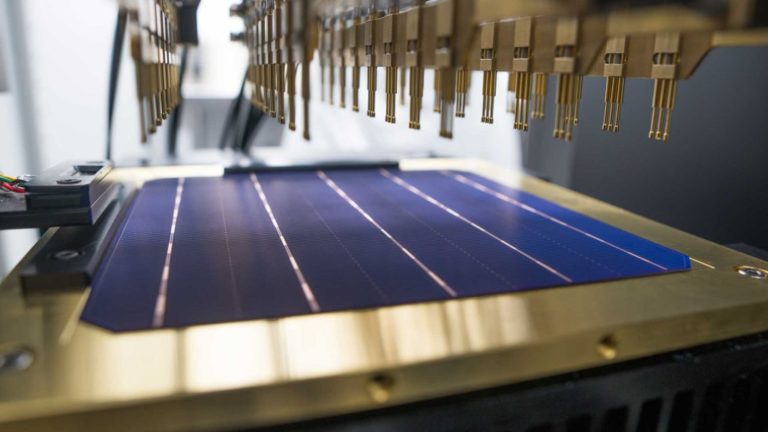Sydney-based solar technology startup SunDrive has rocked the status quo, developing a silver-free solar PV cell and at the same time elevating the world efficiency record for a commercial-size silicon solar cell to 25.54%.
SunDrive said on Thursday night that it has received official word from Germany’s Institute for Solar Energy Research (ISFH) confirming it has set a world record for the efficiency at which its solar cells convert sunlight to electricity.
“SunDrive has officially set a new world record for a commercial size silicon solar cell,” the company posted on social media. “A proud milestone for the team that worked incredibly hard to achieve this.”

The result is a major shake-up for the industry, with China-based solar cell manufacturers topping the efficiency records in recent years. Manufacturing giant Longi Solar held the previous top mark for a commercial-size monocrystalline heterojunction (HJT) solar cell, achieving 25.26% during testing at ISFH earlier this year.
While SunDrive celebrated the world record, the company’s technology – which replaces the expensive silver used in conventional solar cells with cheaper and more abundant copper – could have greater ramifications, potentially lowering the manufacturing cost of solar PV panels.
Silver is a core component in today’s solar panels. It is estimated that solar panel manufacturing accounts for about 20% of the world’s annual consumption of the precious metal, with the volume expected to rise steeply as the next generation of high-efficiency cells currently being developed require up to three times more silver than their antecedents.
SunDrive’s solution, developed by Chief Executive Vince Allen during his PhD at the University of New South Wales in Sydney, has been to replace the precious metal with copper. Copper doesn’t have the same highly conductive properties as silver and does not adhere well to the surface of the solar cell, but Allen – who founded SunDrive in 2015 along with former flatmate David Hu – has found a solution. And a much more affordable one.
Popular content
“The thing about copper is that it’s very abundant and usually about 100 times cheaper than silver,” Allen explained.
He said that finding more affordable and more abundant materials shapes as a stumbling block for the solar industry if it is to grow as predicted.
“We’re only at the very early stages of where the industry can be with only 3% of the world’s electricity currently coming from solar,” he said. “If we want to get to 50, 60, 70% and beyond, we’re going to need a lot more solar cells and that’s a massive challenge.”
Allen has previously said that SunDrive’s aim is to produce the cells locally. He is optimistic that they can compete with large solar manufacturers in Asia, while still protecting their intellectual property.
“The industry today is at a point where the land and labour costs are becoming less and less significant in the total cost of manufacturing … obviously it does mean that we need to at least match that similar level of automation and throughput, but we do see opportunity to do it in Australia,” he said.
Hu has said the company’s initial focus would be the rooftop sector, as he believes it is the ideal place for SunDrive’s technology to enter into the market. The limited space allows the most efficient solar cells to shine the brightest, producing more energy for every square foot, he explained.
The company has already attracted support from the industry, with the Australian Renewable Energy Agency providing AUD 3 million ($2.2 million) in funding to help scale its manufacturing process. Mike Cannon-Brookes, one of Australia’s wealthiest people, has backed the startup through Grok Ventures. Venture capitalist fund Blackbird has also provided support, while former Suntech CEO Shi Zhengrong was SunDrive’s first angel investor.
This content is protected by copyright and may not be reused. If you want to cooperate with us and would like to reuse some of our content, please contact: editors@pv-magazine.com.



9 comments
By submitting this form you agree to pv magazine using your data for the purposes of publishing your comment.
Your personal data will only be disclosed or otherwise transmitted to third parties for the purposes of spam filtering or if this is necessary for technical maintenance of the website. Any other transfer to third parties will not take place unless this is justified on the basis of applicable data protection regulations or if pv magazine is legally obliged to do so.
You may revoke this consent at any time with effect for the future, in which case your personal data will be deleted immediately. Otherwise, your data will be deleted if pv magazine has processed your request or the purpose of data storage is fulfilled.
Further information on data privacy can be found in our Data Protection Policy.